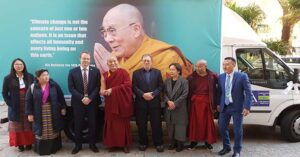
The Tibet Climate Truck
Photo:Tempa Gyaltsen Zamlha /Facebook
The COP25 climate summit, held in Madrid from December 2-13, was attended by Tempa Gyaltsen Zamlha, Head of Environment and Development Desk at the Tibet Policy Institute (TPI). Zamlha leads a team of Tibetan environmental researchers in a bid to increase awareness of the global significance of climatic changes taking place in Tibet.
On December 7, over 100 people turned out to listen to two panel discussions hosted by the TPI. Zamlha highlighted the severe risk from climate change and excessive construction projects such as dams, roads and railway lines on Tibet’s environment. The president of Casa del Tibet in Spain (the Spanish Tibet House Foundation), Ven Thubten Wangchen, spoke on the role of Tibetan culture and Buddhism in environmental protection. Other speakers focused on issues ranging from the extreme temperature rises witnessed on the Tibetan plateau in recent decades, to the forceful relocation of nomads, the pollution of Tibet’s rivers and grassland degradation.
During the conference the Tibetan delegates showcased a message from His Holiness the Dalai Lama using the Tibet Climate Truck. The truck displayed a giant poster of His Holiness along with the message: “Climate change is not just the concern of one or two nations. It is an issue that affects all humanity and every living being on this earth.” The truck was taken to significant locations around Madrid, reportedly drawing strong public attention and interest.
The delegates also joined famed Swedish environmental activist Greta Thunberg during a climate strike held in the city on December 6. These strikes are intended to show the polluting fossil fuel industries and the political leaders in lockstep with them that the common people “will not tolerate inaction on climate change anymore.” Over 500,000 people attended the strike in Madrid.
Post-conference, speaking to Contact magazine, Zamlha explained that discussing the Tibetan environment at international conferences was “never easy”, but that they provided an “ample opportunity for us to highlight the global ecological importance of the Tibetan Plateau and its current environmental situation under Chinese occupation to the global community.” Speaking of his Chinese counterparts, Zamlha said that, whilst they had a “good understanding” on climate change, “they surely do not have an accurate understanding of the current environmental situation in Tibet, and Tibet’s environment is not their priority.”
Zamlha echoed the general consensus that the conference itself was a major disappointment. Plans to draw up rules for a carbon market between countries were postponed until next year’s COP summit in Glasgow, UK. There was likewise no progress on plans for rich countries with historically high carbon emissions to provide compensation to poor vulnerable countries hit by the heaviest impacts of climate change. Professor Johan Rockstrom, director of the Stockholm Resilience Centre and a professor of environmental science at Stockholm University, and a leading researcher on planetary boundaries, said that “kicking the can” was “hardly in line with the climate emergency that we scientists highlighted during COP25.” The World Wildlife Fund (WWF) released a statement after the conference accusing governments in attendance of showing “a staggering lack of leadership.”




 Print
Print Email
Email